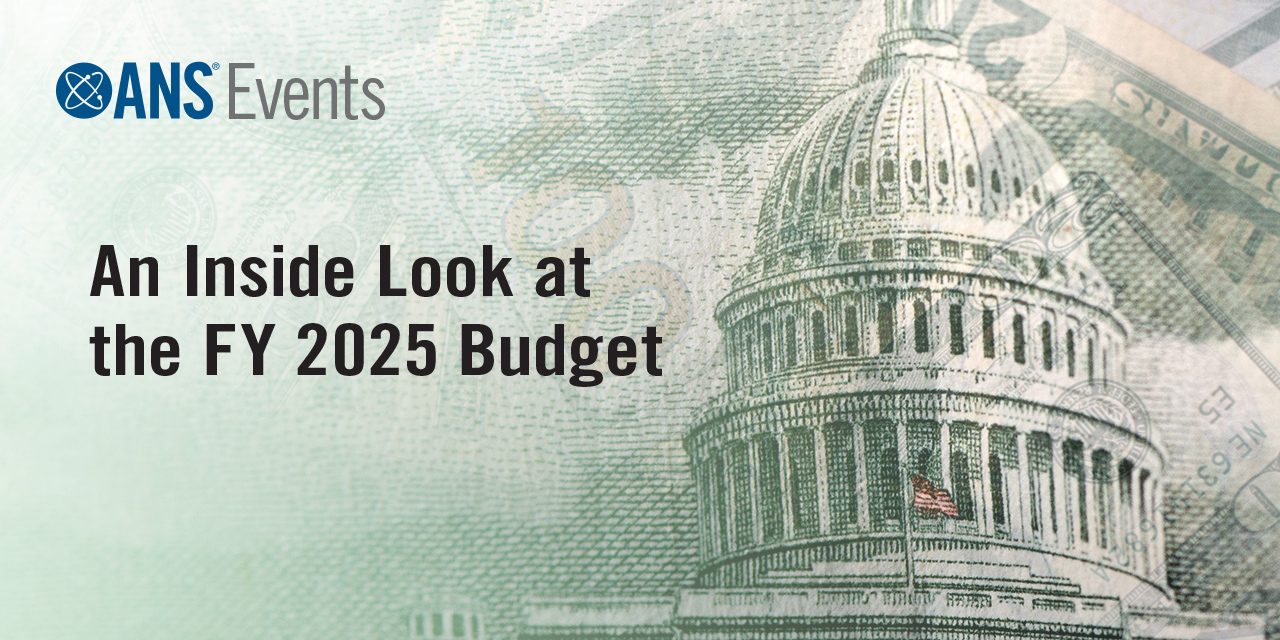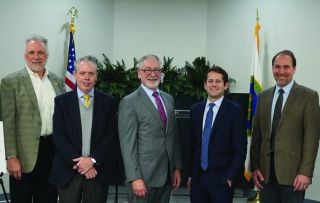DOE-NE leadership discuss nuclear in the FY 2025 budget request

Members of the Department of Energy Office of Nuclear Energy leadership team detailed the DOE's fiscal year 2025 congressional budget request in a webinar hosted last week by the American Nuclear Society. The DOE’s FY 2025 budget request includes nearly $1.6 billion for the Office of Nuclear Energy. The webinar was sponsored by Paragon Energy Solutions; ANS members can view the recording online.

Goff
Mike Goff, principal deputy assistant secretary for DOE-NE, was the primary presenter. Other speakers included deputy assistant secretary Paul Murray, director of the Office of Nuclear Technologies Suibel Schuppner, acting associate deputy assistant secretary for nuclear reactors Alison Hahn, deputy assistant secretary for nuclear fuel cycle Jon Carmack, associate deputy assistant secretary for infrastructure programs Sujita Pierpoint, deputy assistant secretary for international cooperation Aleshia Duncan, and director of the Office of Budget and Planning Patrick Edgerton.
The budget request: Goff spoke about the contents of the budget request as compared to previous years and invited the other DOE-NE leaders to explain new funding for their programs. The president’s budget is a request, not a mandate, and Congress has the authority to ultimately decide how federal funding gets allocated.
“The Biden-Harris administration is very much supportive and does view that nuclear energy is critical in meeting those various goals,” said Goff, referring to climate, environmental, and energy and national security goals. “We really think nuclear energy needs to be tripling between now and 2050. For those of us who have worked in the industry for a long time, we realize that’s a really aggressive goal.”
Goff noted that each year, some areas of the budget go up and some go down. This year, budgeting is going down for reactor concepts and test beds, whose federal funding programs were complete at the end of the year. There are also new line items in the budget compared to some previous years, such as integrated energy systems activities.
Nuclear in the budget: DOE-NE requested $188 million to support a near-term supply of high-assay low-enriched uranium (HALEU) for the agency’s research and demonstration projects. “We will definitively continue near-term production of HALEU from our DOE uranium inventories and continue production at the HALEU enrichment demonstration facility in Piketon, Ohio,” said Carmack.
The request includes continued funding for the Advanced Reactor Demonstration Program risk reduction awards in the amount of $142.5 million. That sum “includes the advanced reactor technologies program and the newly added integrated energy systems program,” said Hahn. “Here the request for each of these programs is less than what the FY 24 appropriations provided but will still allow us to address the highest priority activities.”
Murray touched on spent nuclear fuel and high-level waste management: “The most important thing is that we maintain the knowledge and capability . . . of all the processes and procedures and lessons learned from Yucca Mountain, so when we are ready to start a new repository program, all that knowledge and information is readily available to us so we don’t have to basically reinvent it.”
Schuppner spoke about the request for $143 million to support emerging technologies developed in the U.S., stating, “In FY 25, we will continue the mission of the program to provide competitively awarded opportunities for small business, national laboratories, and universities.” For nuclear enabling technologies, Schuppner added that “plans for FY 25 include $23 million to continue development of advanced materials and manufacturing technologies that benefit multiple reactors.”
Duncan spoke about the requested $8 million to support international nuclear cooperation: “We hope that the [FY] 25 [request] will reflect a ramp-up to support the expansion of our planned work, which will include all of the international engagement carried under [DOE-NE] and both civil nuclear cooperation for our strategic partnerships as well as our commercial opportunities.”
Finally, $32 million for additive manufacturing and AI is also included.







